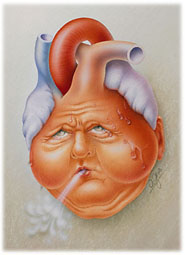Cardiología
Anger, ventricular arrhythmias and sudden death
Fecha de recepción: 31/12/2000
Fecha de aceptación:
31/12/2000


Abstract
Recent studies provide clear and convincing evidence that anger contributes significantly to the
pathogenesis and expression of coronary artery disease. Several investigations have linked
anger attribute to several aspects of coronary artery disease including: 1. - Association with
coronary risk factors (lipid levels, cardiovascular reactivity and blood pressure) 2. - Coronary
disease pathogenesis, morbidity and mortality 3. - Triggering of acute coronary syndromes 4. -
Progression of coronary atherosclerosis induced by anger 5. - Ventricular arrhythmias and
sudden death. Evidence from prospective epidemiological and clinical studies, supported by
experimental studies lend to a casual association between anger and ventricular arrhythmia and
sudden cardiac death
Cardiovascular disease and the impact of pshycological factors
 Recent studies provide clear and convincing evidence that psychosocial factors contribute significantly to the pathogenesis and expression of coronary artery disease (CAD) (1) This evidence is composed largely of data relating coronary disease risk to five (5) specific psychosocial domains (1-3): 1) depression 2) anxiety 3) personality factors and trait. Anger, the focus of the present study is the most important of them 4) social isolation 5) chronic life stress. Recent studies provide clear and convincing evidence that psychosocial factors contribute significantly to the pathogenesis and expression of coronary artery disease (CAD) (1) This evidence is composed largely of data relating coronary disease risk to five (5) specific psychosocial domains (1-3): 1) depression 2) anxiety 3) personality factors and trait. Anger, the focus of the present study is the most important of them 4) social isolation 5) chronic life stress.
Anger is a relatively stable personality trait that is manifested in the frequency, intensity and duration of the anger experience (4). Persons with high compared with low trade anger have rage and fury more often, more intensely and with longer lasting episodes (4).
Pathophysiological mechanisms underlying the relationship between these entities and coronary heart disease can be divided into behavioral mechanisms (4). Whereby psychosocial conditions contribute to a higher frequency of adverse health behaviors, such as smoking and poor diet, and direct pathophysiological mechanism, such as neuroendocrine and platelet activation (1).
Studies have linked anger attribute to several aspects of CAD including (2,3):
-
Association with coronary risk factors including LDL, HDL, triglycerides levels, cardiovascular reactivity and blood pressure (5,6)
-
The association between anger and CAD pathogenesis, morbility and mortality (1,2,7)
-
Triggering of acute coronary syndromes onset by episodes of anger (8)
-
Progression of coronary atherosclerosis induced by anger, independent of medication or other risk factors (9)
-
Ventricular arrhythmia and sudden death (10)
Anger and coronary heart disease
The deleterious effects of anger and cardiovascular health are increasingly gaining attention in the research literature (2,3). Evidence for an anger-CAD association has been derived from studies that use different measures of anger, different CAD end points and different study design (2). The prospective association between anger and CAD was described initially by investigators from the Framingham Heart Study (7), who reported that anger independently predicted the eight-year incidence of CAD. More recently, Williams et al (2) reported in the ARIC study that high trait anger was associated with and increased risk for CAD morbidity and death independent of the established biological risk factors. There was a dose-response relation between level of anger and CAD risk (2).
|